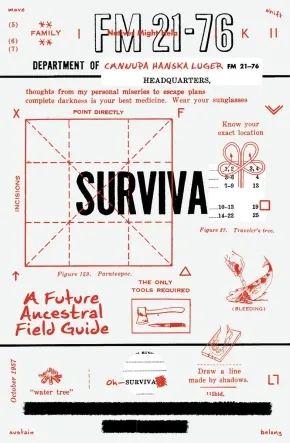Cannupa Hanska Luger
Cannupa Hanska Lugeris a multidisciplinary artist who creates monumental installations, sculpture, and performance to communicate urgent stories of twenty-first-century Indigeneity. Born on the Standing Rock Reservation in North Dakota, Luger is an enrolled member of the Three Affiliated Tribes of Fort Berthold and is Mandan, Hidatsa, Arikara, and Lakota. Luger's bold visual storytelling presents new ways of seeing our collective humanity while foregrounding an Indigenous worldview. His work is in numerous permanent museum collections and has been exhibited around the world, including at the Sharjah Biennial 16, United Arab Emirates; the 81st Whitney Biennial, New York; the 14th Shanghai Biennale; and at the National Gallery of Art in Washington, DC; the Metropolitan Museum of Art in New York; the Gardiner Museum in Toronto; and the National Center for Civil and Human Rights in Georgia. Luger has been awarded fellowships from the Guggenheim Memorial Foundation, United States Artists, Creative Capital, the Smithsonian Institution, the Open Society Foundation, and the Joan Mitchell Foundation, among others. Luger currently lives and works in Glorieta, NM.
Books (1)
Synopsis:
An ambitious, world-envisioning work of Indigenous futurism.
Since 2015—through a proliferation of forms including sculpture, regalia, film, photography, poetry, painting, and installation—acclaimed multimedia artist Cannupa Hanska Luger has been weaving together strands of a new myth. Collectively referred to as Future Ancestral Technologies, this sprawling series of interrelated works seeks to reimagine Indigenous life and culture in a postcolonial world where space exploration has reduced and reconfigured the earth’s population.
Part graphic novel, part art book, SURVIVA: A Future Ancestral Field Guide offers readers a view beneath, beyond, and between the lines of Luger's ever-expanding artistic universe. In this ecstatically hybrid work, Luger transforms a 1970s military survival guide through poetic redaction, speculative fiction, and iterative line drawing—deftly surfacing and disrupting the colonial subconscious that haunts this vexed source text. An epic and timely meditation on planetary life in the midst of transformation, SURVIVA boldly presents an earth-based, demilitarized futuredream that foregrounds Indigenous knowledge as critical to humanity’s survival
SURVIVA is the first title from Aora Books, a publishing imprint dedicated to exploring transformational thought and culture that transcends borders, disciplines, and traditions. Rooted in an ethos of polyvocality and planetary consciousness, Aora publishes works that forge bold connections across time, place, ideas, and beings often seen as separate.
Reviews
"SURVIVA offers Indigenous wisdom for a shared future built on ancestral knowledge in radical relation. This is a survival guide like none other." —Candice Hopkins, curator of the Forge Project
"SURVIVA boldly reimagines our conceptions of time and history, challenging our collective narratives and pushing us to rethink the art of survival through a lens of transformation."—Hank Willis Thomas, artist and cofounder of For Freedoms
"Cannupa Hanska Luger has created a wondrous book of survivance, a story to carry in pocket and study at every opportunity. At once a dystopia (earth is near destroyed) and a postcolonial fantasy (the colonizers abandon the planet for good), SURVIVA is a work of artistic brilliance that draws our attention to the simultaneity of ruins and futures. Rich with dreampower and evocation, these pages illustrate the mysteries of space-time, the dissolution of boundaries, and the relational universe described by Indigenous quantum mechanics. Read carefully, SURVIVA has the power to bend time itself, lifting us from past and present into futures innumerable."—Philip J. Deloria, Leverett Saltonstall Professor of History at Harvard University and author of Playing Indian
Additional Information
162 pages | 5.44" x 8.31" | original line drawings & ecopoetic fragments - reminiscent of 1970s diy photocopy culture | Paperback






